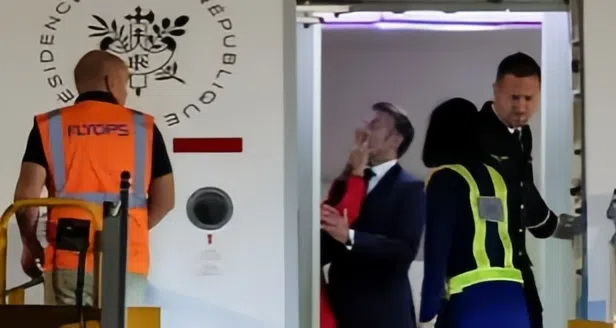
When a President’s Private Life Becomes a Battleground: The Hidden War of International Propaganda Behind Macron’s ‘Slap’ Video
Introduction
A five-second video clip has thrust French President Emmanuel Macron and his wife, Brigitte, into the global spotlight. Captured during a visit to Vietnam, the moment Brigitte’s hand appeared to push her husband’s face was seized by Russian state media and French far-right accounts, morphing into an absurd conspiracy theory about a “domestic dispute.” Behind this spectacle lies not just a textbook case of information warfare but a stark revelation of how “alternative truths” are weaponized in global politics.
I. The Five-Second Video That Sparked a Global Firestorm
· Political Witch Hunts in the Age of Fragmented Truth
The original footage, filmed by an Associated Press cameraperson, shows the Macrons sharing a lighthearted moment at the plane’s doorway: Brigitte’s hand seems to playfully nudge Emmanuel’s face, prompting him to step back with a smile before waving to the crowd. But in the hands of Russian RT TV, the clip was edited with captions declaring, “France’s First Lady Throws a Right Hook.”
· The Conspiracy Theorists’ Playbook
Russian Foreign Ministry spokesperson Maria Zakharova mocked the scene on Telegram: “Was it a gentle pat, or the ‘hand of the Kremlin’?” French far-right accounts piled on, deriding Macron’s foreign policy as that of a “battered husband.” A mundane moment was rebranded as evidence of marital strife and presidential weakness—igniting a propaganda powder keg.
II. Macron’s Art of Crisis Management
· Defusing Attacks with Humor
Facing reporters, Macron shrugged it off: “We joke around like this all the time—maybe I should start wearing a helmet next time?” An Élysée Palace official added, “It’s their little ritual to decompress before official events. The president teases her, and she ‘retaliates.’” Behind the levity was a calculated strategy: refusing to legitimize false narratives while exposing the attackers’ motives.
· The Truth Behind the Information War
Macron didn’t hold back: “These ‘old friends’—Russia and domestic extremists—will twist anything, even claiming my coffee cup held cocaine.” He referenced past smears, like false claims of a “brawl with Erdogan” or “drug use on a train,” framing it as a coordinated effort to assassinate his character and erode public trust.
III. The Vietnam Visit: The Real Geopolitical Chess Game Overshadowed by Noise
· The $9.8 Billion Deals and France’s Strategic Ambitions
While the world fixated on the “slap” drama, France and Vietnam quietly signed agreements on Airbus purchases, nuclear energy cooperation, and defense partnerships. These moves aren’t just about countering U.S. tariffs—they’re part of France’s Indo-Pacific strategy to carve a foothold in Southeast Asia, balancing influence against China and the U.S.
· Why Do Personal Scandals Always Go Viral?
Ironically, in-depth reports on the France-Vietnam deals garnered less than 10% of the attention the “face push” video received. This underscores a golden rule of information warfare: public obsession with leaders’ private lives is far easier to weaponize than policy debates. Russia knows this well—distract with gossip, let strategy unfold in the shadows.
IV. Information Warfare 2.0: How to Resist the “Half-Truth” Trap
· The Evolution of Disinformation
From the “cocaine tissue” hoax to the “abused president” narrative, attackers no longer rely on pure fiction. Instead, they splice real footage with fake context. As Macron put it: “They take a clip of you drinking water and claim you’re swallowing pills.”
· A Survival Guide for the Digital Age
When bombarded with viral content, ask three questions:
-
Who’s pushing this? (Russian bots and far-right accounts often work in tandem.)
-
Is there proof beyond a soundbite? (Does a 5-second clip prove “domestic abuse”?)
-
Who benefits? (Hint: Macron’s Vietnam deals fading from headlines? Follow the winners.)
Conclusion: When Politics Becomes Reality TV
Macron’s ordeal is no outlier. In an era where TikTok drives narratives and scandals dominate headlines, leaders’ personal lives have become extensions of geopolitical battlegrounds. Next time you see a viral clip of a “world leader’s humiliation,” pause. Ask yourself: Is this the truth, or just a script someone wants you to follow?




